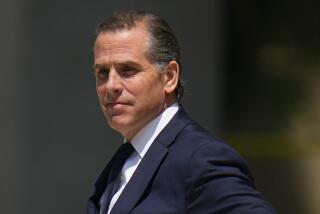Hearings on Future of Wahid Are Set
- Share via
JAKARTA, Indonesia — Leaders of parliament decided Thursday that they will not seek a quick end to this country’s political crisis but will wait until Aug. 1 to begin hearings on whether to unseat President Abdurrahman Wahid.
The decision, which is in keeping with the constitution’s slow and cumbersome process for removing a president, gives Wahid additional time to rally support and seek a compromise that would let him remain in power.
Parliament voted overwhelmingly Wednesday to convene Indonesia’s highest constitutional body, the People’s Consultative Assembly, to consider whether to remove Wahid because of his alleged role in two corruption scandals and his lackluster leadership.
Wahid appeared Thursday at a news conference during a meeting of leaders from developing nations but testily refused to answer questions about the decision in parliament. He has insisted that he will not resign.
The president has few options for saving his job. He had threatened to declare a state of emergency and dissolve parliament, but even his own security chief publicly warned him not to do so.
“Issuing a decree in a situation like this is not appropriate, and we hope this decision will not be taken,” said Susilo Bambang Yudhoyono, the security chief.
The country’s top generals have said they would not enforce an order declaring martial law. Amien Rais, speaker of the People’s Consultative Assembly, said the 700-member body would ignore any presidential decree dissolving parliament and would respond by accelerating its timetable for removing Wahid.
“Unfortunately, he has lost the trust of the people, and we must say enough is enough,” Rais told CNN. “Only a miracle can help him.”
Despite fears that Wahid’s supporters would turn violent in Jakarta, the capital, the number of demonstrators dwindled to about 2,000 on Thursday, police said. Protesters gathered peacefully outside the president’s residence and urged him to dissolve parliament.
In East Java, where Wahid’s backers had rioted and burned buildings during the preceding three days, the streets were calm, authorities said.
Parliament has accused Wahid of involvement in the theft of $4.1 million in government funds and of improperly reporting $2 million he received from the sultan of Brunei. However, it has produced no proof that the president personally profited. Indonesia’s attorney general, a Wahid appointee, on Monday cleared the president of the charges.
Since February, when parliament initiated the process of removing the president, dissatisfaction with Wahid’s handling of the country’s economic and social problems has grown considerably. The People’s Consultative Assembly, which elected Wahid president 19 months ago, has the authority to remove him from office simply if it is unhappy with his performance.
Assembly leaders have scheduled an eight-day session, which will begin with an address by the president explaining his actions. The assembly will debate the matter for the following three days and then vote on the session’s fifth day. If the vote goes against the president, he will have a chance to respond on the sixth day, with a final vote on the seventh day.
If the assembly voted to remove him from office, Vice President Megawati Sukarnoputri would be sworn in as president immediately. On the eighth day, the assembly would select a new vice president if Megawati decided she wanted one. Assembly leaders say she could choose to leave the position vacant.
More to Read
Sign up for Essential California
The most important California stories and recommendations in your inbox every morning.
You may occasionally receive promotional content from the Los Angeles Times.













